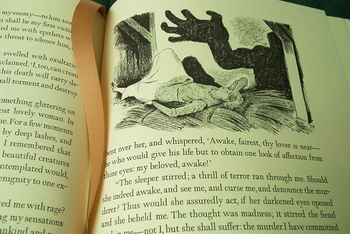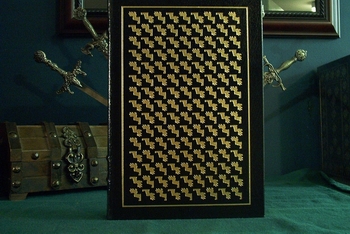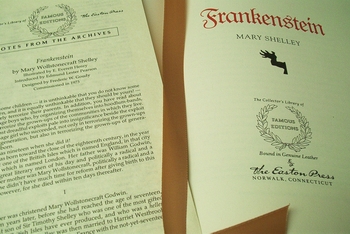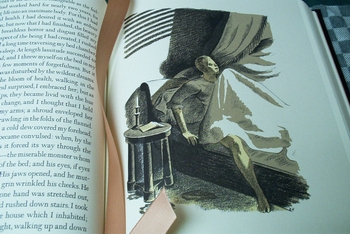Easton Press Mary Shelley books
Frankenstein - Part of 3 volume Classics of Horror set including Dracula and Phantom of The Opera - 1962
Frankenstein - Collector's Library of Famous Editions - 1995
Frankenstein - 100 Greatest Books Ever Written - 2003
Frankenstein - Horror Classics (13 volume set) - 2003
Author Mary Shelley
Mary Wollstonecraft Shelley, born on August 30, 1797, in London, England, was a writer whose imagination and creativity reshaped the landscape of literature. She was the daughter of philosopher William Godwin and feminist pioneer Mary Wollstonecraft, and her upbringing was marked by intellectual stimulation and unconventional ideas. At the age of 16, Mary met the poet Percy Bysshe Shelley, who would later become her husband. Their relationship was passionate and tumultuous, characterized by a shared love of literature and radical politics. In the summer of 1816, Mary and Percy traveled to Geneva, Switzerland, where they spent time with Lord Byron and other literary figures. It was during this trip that Mary conceived the idea for her most famous work, Frankenstein; or, The Modern Prometheus.
Published anonymously in 1818, Frankenstein tells the story of Victor Frankenstein, a young scientist who creates a sentient creature in his laboratory. The novel explores themes of ambition, responsibility, and the consequences of playing god, and it is widely regarded as one of the earliest examples of science fiction. Mary's groundbreaking narrative and her exploration of the ethical implications of scientific advancement continue to resonate with readers to this day. Despite the success of Frankenstein, Mary faced numerous challenges in her personal life. She endured the tragic deaths of several of her children, and her marriage to Percy was plagued by financial difficulties and infidelity. However, Mary remained dedicated to her writing, producing novels, short stories, and essays throughout her life.
In addition to her literary pursuits, Mary was a devoted advocate for social justice and women's rights. She was deeply influenced by the feminist ideals of her mother and sought to challenge the patriarchal norms of her time through her writing. Mary's novel The Last Man, published in 1826, imagines a future world devastated by plague and explores themes of power, loss, and resilience.
Mary Shelley passed away on February 1, 1851, at the age of 53, leaving behind a legacy that continues to inspire and captivate readers around the world. Her innovative approach to storytelling, her exploration of complex moral and philosophical questions, and her pioneering role in the development of science fiction have secured her a place as one of the most important figures in literary history. Mary Shelley's enduring influence serves as a testament to the power of imagination and the enduring relevance of her ideas.
Frankenstein
Frankenstein; or, The Modern Prometheus, most often referred to simply as Frankenstein, stands as one of the most iconic and influential works in literary history. Written by Mary Shelley, it was first published anonymously in 1818 and has since become a cornerstone of the horror genre and a timeless exploration of the human condition. The genesis of Frankenstein traces back to the summer of 1816, when Mary Shelley, then Mary Godwin, along with her husband Percy Bysshe Shelley and their friend Lord Byron, spent time in Geneva, Switzerland. It was during this stay that the group engaged in a friendly competition to write the best ghost story. Mary's imagination was sparked by discussions on the nature of life and the potential consequences of scientific experimentation, leading her to conceive the story of Victor Frankenstein and his monstrous creation.
At its heart, Frankenstein is a cautionary tale about the dangers of unchecked ambition and the pursuit of knowledge without regard for its ethical implications. The novel follows Victor Frankenstein, a young scientist obsessed with unlocking the secrets of life and death. In his fervor, he creates a creature assembled from stolen body parts, only to recoil in horror at the grotesque being he has brought to life. The creature, abandoned and rejected by its creator, seeks revenge, leading to a tragic series of events that culminate in a confrontation between creator and creation. What sets Frankenstein apart from other Gothic tales of its time is its exploration of complex moral and philosophical themes. Mary Shelley delves into questions of identity, responsibility, and the nature of humanity, challenging readers to confront their own preconceptions and biases. Through the character of the creature, she offers a poignant commentary on the dangers of alienation and the power of empathy and understanding.
Over the years, Frankenstein has been adapted countless times in various forms of media, including stage plays, films, and television shows. Its enduring popularity speaks to the universal appeal of its themes and characters, as well as its ability to provoke thought and discussion across generations.
Beyond its status as a classic work of literature, Frankenstein continues to resonate with contemporary audiences for its relevance to ongoing debates about science, technology, and the ethical responsibilities of creators. Mary Shelley's masterpiece remains as vital and compelling today as it was over two centuries ago, a testament to the enduring power of storytelling to captivate the imagination and illuminate the human experience.
Mary Shelley quotes
"The beginning is always today."
"The companions of our childhood always possess a certain power over our minds which hardly any later friend can obtain."
"Invention, it must be humbly admitted, does not consist in creating out of void but out of chaos."
"The last man! Yes I may well describe that solitary being's feelings, feeling myself as the last relic of a beloved race, my companions extinct before me." - from The Last Man
Frankenstein quotes
"Beware; for I am fearless, and therefore powerful."
"Nothing is so painful to the human mind as a great and sudden change."
"Life, although it may only be an accumulation of anguish, is dear to me, and I will defend it."
"The beauty of the dream vanished, and breathless horror and disgust filled my heart."
"The world was to me a secret which I desired to divine."
"My dreams were all my own; I accounted for them to nobody; they were my refuge when annoyed - my dearest pleasure when free."





No comments:
Post a Comment
Share your best book review and recommendation